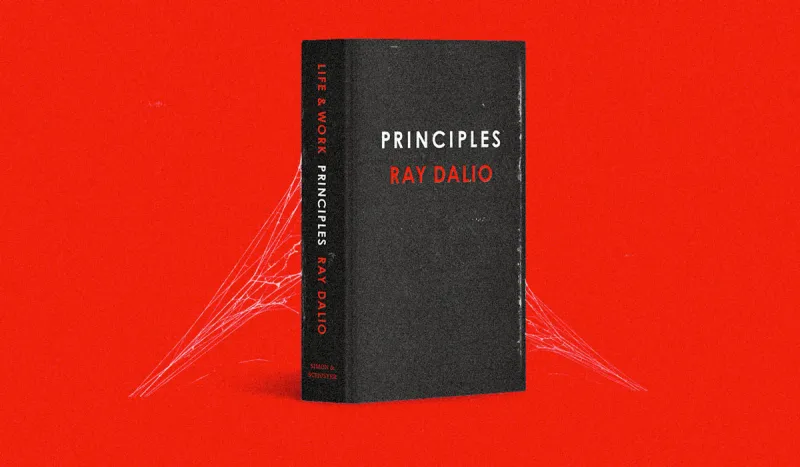
Illustration by II
Ray Dalio’s Principles: Life and Work has sold nearly one million copies worldwide since it was released on September 19, 2017.
It was a New York Times #1 best-seller and named Amazon’s #1 business book of 2017.
A shorter version has been downloaded over three million times since it was made available for free in 2010.
Yet what impact — if any — is it actually having?
The popularity of the book rests in its revelation of the “magic” formula that is the source of his success and that of Bridgewater Associates, the world’s largest hedge fund firm, which Dalio founded and continues to lead.
The formula? Create a believability-weighted idea meritocratic culture by rigorously applying a specific set of Dalio’s own principles, including radical truth and radical transparency, and by supporting this application with various proprietary algorithms and technologies.
Dalio is unequivocal that the principles articulated in the book are “the reason behind my and Bridgewater’s successes.”
As he explained to Charlie Rose, “Our goal is idea-meritocratic thinking. Because if you can make great collective decision making and you can then write those decision-making criteria down in principles and then we’ve convert those to algorithms that make computer decisions in parallel, that’s been our formula for success.”
Dalio decided to share the magic because he believed others could benefit from them.
“I feel that it is my responsibility at this stage in life to pass along the principles that helped me,” he has written. Explicit in Dalio’s magnanimity is his belief of the principles’ universality: “anyone following these principles can expect to produce broadly similar results.” If this were not the case, then there would be no reason (altruistic or otherwise) for organizing and sharing them.
Given the number of books sold, the millions of PDFs downloaded, and Dalio’s claim that the principles have “been applied, increasingly, in a lot of other places,” I set out to find one company that had done so.
Specifically, I wanted a firm (ideally an asset manager) that embraced the principles in the same full-throated way as Bridgewater, meaning they used Dalio’s rules — including radical truth, radical transparency, triangulation, and other critical concepts — as well as algorithms and the supporting technologies to create a believability-weighted idea meritocracy.
I disqualified any firms that might adopt a milquetoast version like this one offered by a former Bridgewater employee. “There’s nothing magical about the number 210” — the number codified in Dalio’s book — “and I don’t feel l compelled to pursue all of the Principles like merit badges. Some I follow faithfully; others inspire me to formulate my own that fit into the context of my business. In the end, Dalio’s Principles comes down to being extremely clear about what you want to achieve and extremely honest in how you pursue it. Sound advice for any situation.”
Sound advice, maybe, but her conclusion represents a common bastardization that reduces Dalio’s work to a disjunctive set of precepts and aphorisms that a user is free combine as they see fit. Dalio is clear that the principles’ power is in their unity. “This collection of these principles were things that took me from having nothing to having what people conventionally think of as success,” he has written.
Dalio occasionally encourages diluted adoption. For example, “My hope is that reading this book will prompt you and others to discover your own principles from wherever you think is best and ideally write them down.” But critics should not be fooled by this gambit: Dalio is adamant that his specific 210 principles are the source of his success. In fact, he unambiguously characterizes the two most common forms of decision making — autocratic and democratic — as suboptimal alternatives. “Both systems produce inferior decision making. That’s because the best decisions are made by an idea meritocracy with believability-weighted decision making.”
One other point on the scope of my inquiry: I sought a company, not an individual. While Dalio generally positions the principles as applicable to organizations and individuals, I simply do not see how individuals could use the principles to achieve the magic. Putting aside the general inaccessibility of the required algorithms and technologies, there can be no idea meritocracy of one.
I began my search by asking Bridgewater if they could identify a firm that adopted the principles, but the company declined to comment on the record.
I then asked a cross-section of asset management industry participants (asset owners, asset managers, and investment consultants) if they could identify a single asset manager that has incorporated Dalio’s principles into its business.
They could not produce a single example.
I found this astoundingly odd. Given the current state of active management, I would expect at least one of Bridgewater’s lesser peers to accept Dalio’s gift and use the principles to rehabilitate its own struggling business. I also expected to find at least one former Bridgewater employee (who left on good terms) using the principles to replicate their former boss’ culture in their startup. More strikingly, I could not even find a firm that incorporated even a partial but strong form of the critical elements of the principles (e.g., radical truth plus video surveillance).
Finding no true disciple in our industry, I broadened my search. In a LinkedIn post, Dalio suggests, “If you haven't yet read and judged Principles for yourself, I suggest you scan some of the assessments made by others, including those of some of the most successful people in the world in a wide range of domains.”
I followed Dalio’s suggestion and considered the assessments made by nine luminaries in a full-page ad in the business section of the New York Times: Arianna Huffington, Jamie Dimon, Bill Gates, Reed Hastings, Andrew Ross Sorkin, Adam Grant, Mike Bloomberg, Tony Robbins, and Stephen Schwarzman.
I emailed each endorser and asked if they had incorporated Dalio’s beliefs at their firms or knew of companies that had done so. I received a single response: a representative of Gates replied that Gates was not available for an interview (which I had not requested).
I next turned to the endorsers listed on the Principles website, which included the above names and 37 others.
I contacted the few noteworthy people I recognized — Marc Benioff, Mark Cuban, Jack Dorsey, and Sean (P. Diddy) Combs, Tim Ferriss — and received two responses: Cuban replied that he had “not yet” adopted the principles and Benioff’s representative said his schedule did not allow him to participate.
The other names on the list were unfamiliar to me because they were non-celebrity endorsers who seemed to share a common trait: they were one of the 356 five-star Amazon reviews of Principles.
For example, Marco B. called Principles, “A must read for anyone who wants to learn great principles for personal and professional success.” He gave a similarly glowing five-star review of Prime Lab Men’s Testosterone Booster (“Great Product! Been using it for a few weeks and can definitely notice the difference.”)
In the end, my search failed to produce a single organization that adopted the principles in a Bridgewater-like manner.
This result both confirmed for me Dalio’s strident claim that the principles in their authentic Bridgewater expression are the source of the magic that produced his and Bridgewater’s tremendous success and refuted Dalio’s claims that the principles are universally applicable.
The absence of a true disciple, even among those firms that could replicate the technology (e.g., Twitter, Salesforce, Microsoft), and the presence of other firms that achieved equal levels success without Dalio’s principles and with their own autocratic or democratic decision-making principles (e.g., Renaissance Technologies, Bloomberg, Apple, Google, Amazon) led me to conclude that principles are endemic to Dalio and Bridgewater and that Bridgewater is a singular manifestation of Dalio’s historical consciousness. Bridgewater represents a one-of-a-kind convergence of personality, vision, message, and technology that cannot be fully duplicated — in spite of Dalio’s magnanimity.
All those readers — and the 25,000 people who have contacted Dalio since Principles’ publication to learn more — are destined to adopt an adulterated form that, nevertheless, might well help them find success in their lives and work.
But they will never find the magic.





